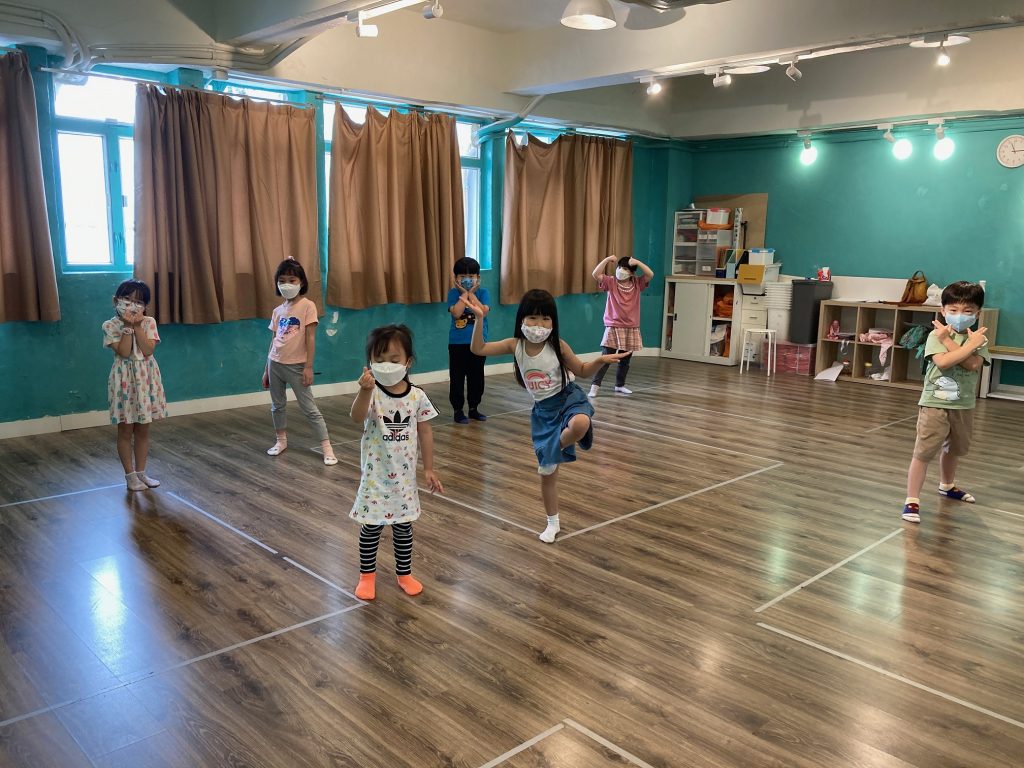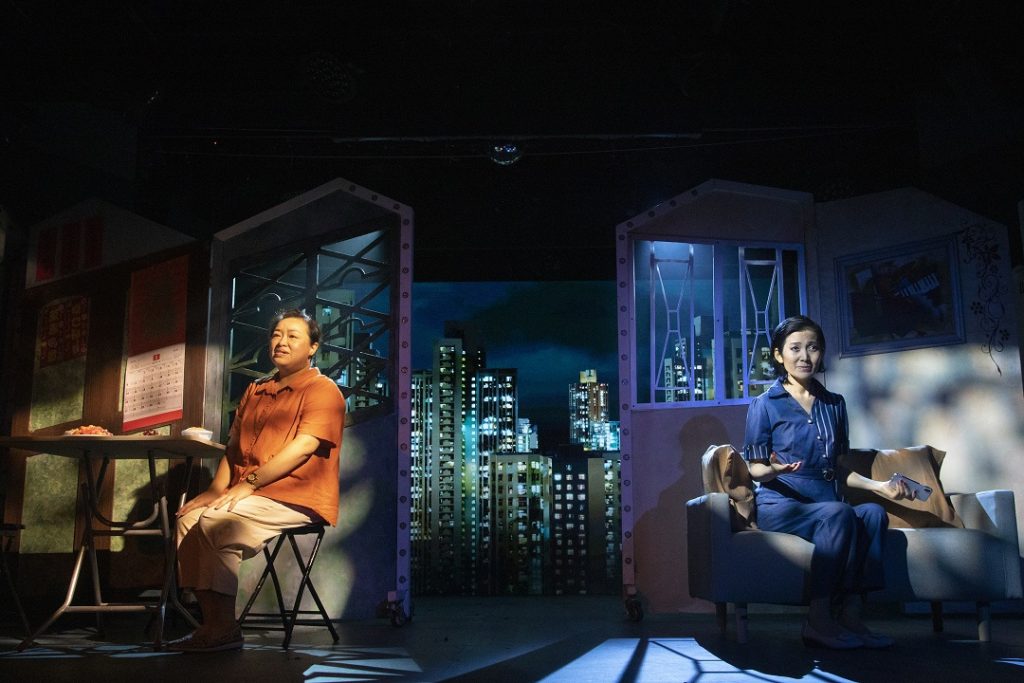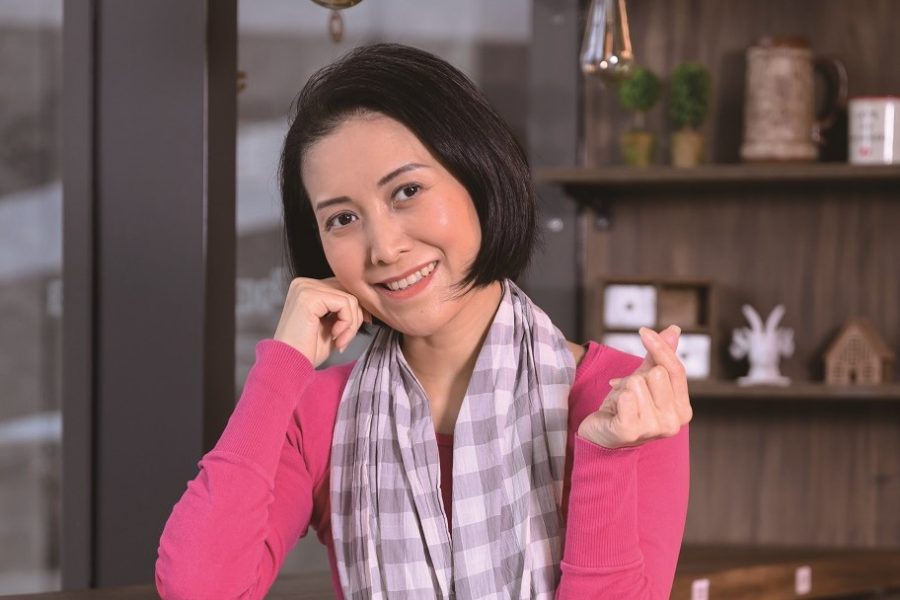In 2006, long before playgroups became popular in Hong Kong, Michelle Ma had already been teaching theatre classes for families at Hong Kong Children’s Musical Theatre (CMT). By incorporating practical theories of early childhood education and artistic elements such as singing, dancing and acting into the curriculum, she crafted a holistic music programme specifically for children aged from two to three. Michelle believes that theatre is extremely beneficial for children’s growth and development: “Toddlers should focus their energy on physical development such as balance and spatial awareness. If these skills are not developed at a young age, they may never be acquired later in life.”
A pioneer in theatre education for toddlers in Hong Kong
When Michelle was little, she was overwhelmed with the impression that theatre meant putting on heavy make-up and speaking in an exaggerated manner. Her perspective only changed when she was introduced to a free theatre class when she was in secondary school. Taught by graduates from the Hong Kong Academy for Performing Arts (HKAPA), the class offered not only theatre training but vocal and physical exercises. Out of curiosity, Michelle signed up for the class and quickly discovered a life-transforming passion for theatre arts. Albeit busy with schoolwork during Form Four and Five, she never gave up on this hobby. With the support of her parents, Michelle furthered her studies in HKAPA and has since become an active member of the performing arts industry. Michelle began teaching theatre classes for children when she was in secondary school. “When I was a secondary school student, I learnt theatre at professional theatre groups including Prospects Theatre, Sha Tin Theatre, Chung Ying Theatre Company and Hong Kong Repertory Theatre. Unlike my peers who worked at fast food restaurants, I taught theatre classes for children during the summer holidays. I started with teaching primary and secondary school students, and then one day, I was asked to lead a family theatre class for toddlers aged from two to three and their parents at CMT. Since I had never taught children below primary school age before, I was nervous and worried.” There were no similar classes at the time, so Michelle had to develop the curriculum from scratch. She did a lot of research and reading about infant and toddler development in an effort to integrate parenting techniques into her curriculum. “Most children enjoy singing and dancing. Through theatre as a medium, they can learn how to move their bodies whilst developing language skills during the babbling stage.” Thanks to the support of her students’ parents, she has been teaching family classes at CMT since 2006. As a leading figure in early childhood theatre education, she is now the Head of Drama at HK Kids Talent Academy, where she continues to inspire and nurture young talents.

Theatre education boosts multiple intelligences in toddlers
Michelle believes drama plays a crucial role in early childhood development as it not only teaches theatrical performance but also activates children’s physical and mental aspects of intelligence. “Singing boosts vocal and language development – even mere shouting helps children express their emotions. Dancing improves children’s motor coordination and spatial intelligence, while acting cultivates empathy in children.” Michelle notes that singing also teaches children the importance of articulation. Even when children can pronounce every word clearly, it is important that they truly understand the meaning behind the script. “Articulation is a communication technique. The pandemic has deprived children of the opportunity to communicate with others, making it more challenging for them to master the skill of articulation.” For children who are too young to recite the dialogue, Michelle encourages them to learn how to use their voices properly by mimicking sounds like a dog barking. Shouting also helps children release their emotions. Michelle explains, “Adults often overlook toddlers’ repressed emotions. Sometimes, kids scream out of the blue just to exercise their vocal cords and brain. Without understanding the reason behind this, adults naturally try to stop them from shouting. In my classroom, children can shout whenever they feel like to.”
The lack of exercise reduces the body’s flexibility, resulting in muscle stiffness. In Michelle’s class, she would ask one of her students to create and demonstrate a set of movements for others to follow. When others mimic the movements, they get to use muscles they rarely use and discover something new with their bodies. The goal of dance training is not to prepare kids for a professional dance career, but to teach them techniques they will use for the rest of their lives. “I have created a spatial intelligence exercise that I ask my students to walk around in the classroom without touching anything. Dancing improves our physical capabilities and spatial awareness. If toddlers do not develop balance and spatial perception at an early age, they may never learn these skills in the future. Scoliosis, for example, is a physical manifestation of poor balance and spatial awareness.” Michelle believes that acting is not only a form of storytelling but also requires understanding of different people. Children learn empathy by immersing themselves in stories and sharing other people’s feelings. “Simple stories like ‘The Tortoise and the Hare’ can, too, teach children to empathise with the characters. For example, ask children: how did the tortoise feel when it was mocked by the hare? These moral values should be softly instilled in children. Instead of directly telling my students what is right or wrong, I hope they can empathise with the characters and recognise the tortoise’s feelings of hurt when being mocked by the hare.” To Michelle, the value of theatre education is that it allows children to immerse themselves in stories and walk in the characters’ shoes. They will remember this feeling for the rest of their lives.
Theatre is more beneficial for shy and introverted kids
Some parents mistakenly believe that theatre education is only for children who are natural performers, singers or actors. However, it is even more beneficial for reserved and introverted children. Michelle explains, “It is easy to hone the skills of children who are already natural performers. Yet, theatre education holds greater significance for those with low self-esteem.” She once taught a little girl who would sit quietly in the corner. “When she finally spoke, I praised her voice to encourage her to speak up more often. Although she kept a poker face, perhaps to hide her happiness upon my compliment, she became the lead actress in a play six months later. It almost moved me to tears when I saw the performance.”
Michelle admits that some of her students have zero interest in acting. She adds, “They hate singing, dancing and acting. While they often ask me not to call on them to perform in front of the class, they may have the potential to work behind the scenes in the future. Tom Chan, the playwright and director of ‘Our Journal of Springtime the Musical’, started as a young actor as well.” Michelle points out the many lessons children learn from being a theatre actor, such as exposure to different behind-the-scenes roles. Children who are interested in these roles will quietly observe until they become motivated to pursue further training in related fields.
Parenting with theatrical skills
Michelle has been teaching her five-year-old son using the Montessori education principles at home and the Waldorf teaching method at school. She believes that children under the age of three need constant exposure to nature and sufficient space for their physical development. Learning coordination skills is more important than learning how to write. Even though her son is enrolled in a mainstream school, she opposes teaching children to write too early. “I have explained to my son’s teachers where I am coming from and they are very understanding. My son can complete his writing exercises if he wants – I will neither force him to do his homework nor correct his work.” Michelle finds that the skills she acquired from theatre and her career have been helpful in her parenting journey. From a theatre education programme in the UK where she must put on a theatrical production at different schools after writing the script, Michelle learnt the importance of positive language for children and acquired many negotiation techniques to better communicate with them. “It is not uncommon for parents to say hurtful things to their children when they are under overwhelming work stress, yet it takes a lot of efforts to repair the relationship afterwards. What I would do is to discuss our mistakes with my son. During my time at HKAPA, I learnt how to analyse stories or characters because every villain has an angle. I like to approach our issues from a similar perspective with my son.” Michelle uses theatrical techniques to boost her son’s language skills too. “As my son likes to role-play as a policeman, I often play with him by setting up an imaginary police centre by my bed. He uses the pillow as a computer and pretends to be a policeman using different props and his imagination. We usually make up a crime by brainstorming the time, place and people involved, and then contemplate how we would mobilise the police force together. Every time he reports a case to the police centre is a form of language exercise for him.”
Becoming a better person through parenting
Michelle values communication and compassion above all else in her parenting approach. “All parents love their children. Yet, we sometimes use an incorrect parenting method that hinders our children’s growth. If parents truly want to learn about child development, they will do the research out of love. I am grateful for my husband’s support for my parenting approach as mutual trust and joint efforts between the parents are crucial to child growth. My husband is a very caring father that would spend a lot of time with our son, and he is the one taking our son to Waldorf school, all the way in Yuen Long every day.” Michelle regards her son’s birth as her greatest source of motivation to become a better person. “Ever since we welcomed our son into the family, I have taken better care of my health by maintaining a nutritious diet and a regular sleep schedule,” says Michelle. She agrees that children are mirrors of their parents’ behaviours: “One day when I was working in the kitchen, my three-year-old son leaned on the cabinet and told me that I was annoying. Shocked and upset, I wondered why he felt that way and how he could express his opinion so clearly – perhaps he found my hygiene obsession unnecessary. Self-reflection is crucial for parents to empathise with their children. As parents, do you try to see the world from your children’s perspective? I have learnt empathy from my students and my son. I am thankful for my son for motivating me to become a better person.”

In “Our Journal of Springtime the Musical”, Michelle plays the role of Jessica’s mother. She appreciates the opportunity to be a part of the musical despite not being a prolific actress. “I have known Tom, who was a student of mine, for over a decade. When he invited me to watch the trial performance, my son had just turned one year old. I was moved by the production as a new mother. In 2020, my son was three years old when Tom invited me to play the role of Jessica’s mother. I readily accepted his offer as I then had a better understanding of motherhood. Playing this role has reminded me to let go when my son grows older.” As an actress, Michelle believes that long-running musicals are especially beneficial to actors in their creative process, as they allow actors to take time to reflect and gradually shape their characters in depth.

